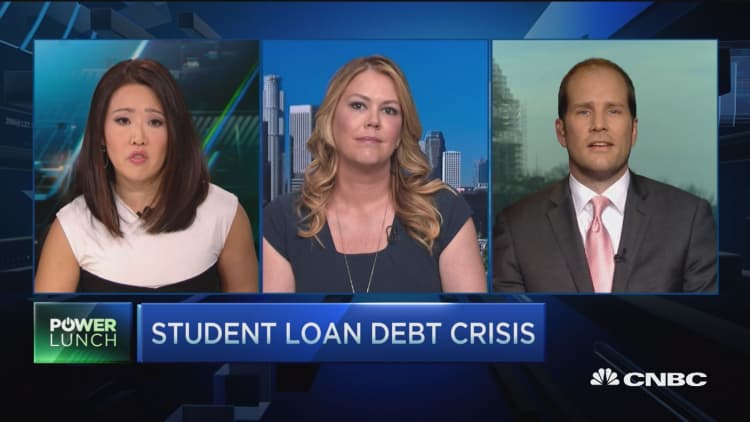
Americans owe a staggering $1.3 trillion in student loans — a debt load that looks set to not just grow, but also pile up faster in coming years.
Yet, even with economists and politicians across party lines raising concerns about the swell in outstanding student debt, some experts say it's too early to conclude the loans are dampening the economic recovery.
"I think the evidence that this is having a drag on the economy is unclear as of now," said Andrew Kelly, director of the Center on Higher Education Reform at the American Enterprise Institute, on CNBC's "Power Lunch."
"More student debt means that more people are getting an education," he said Wednesday. "People who get an education have higher wages. They pay more in taxes; they buy more things."
Economists aren't so sure. Earlier this month, researchers at the St. Louis Fed's Center for Household Financial Stability said in a paper that student debt may "present a significant headwind for the aggregate economy."
What makes student debt particularly concerning, the economists wrote, is that much of it is held by younger borrowers — which may inhibit them from buying homes, investing, or saving for retirement as they age.
Kelly, however, believes the "crisis rhetoric" surrounding student debt has been overblown.
The fact that 43 million people owe student debt is not in and of itself a problem, he said. Instead, he sees the issue lying with the group of borrowers who struggle the most to meet repayments.
"They're not the people with the six-figure debts that you hear about in the front page of The New York Times," Kelly said. "They tend to be people who have very low debts who drop out before earning a degree."
The best way to tackle the problem? In part, experts say, it might be continuing to question one of the main roots of the problem: the rising cost of college.
"You can't talk about student debt without talking about the high cost of college," said Natalia Abrams, executive director of the nonprofit StudentDebtCrisis.org, also on "Power Lunch."







